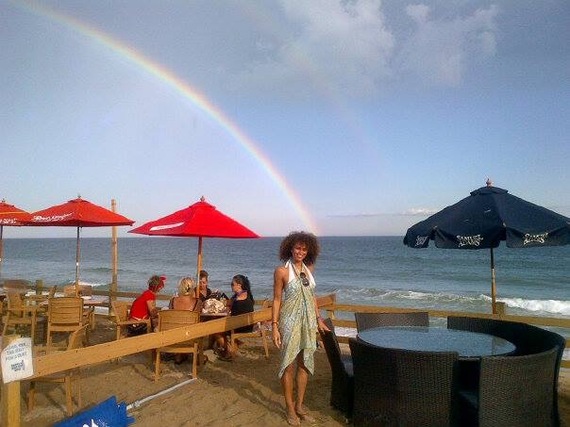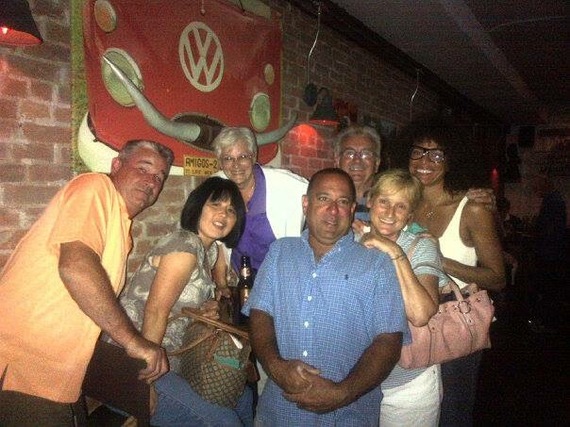It's March. When I think of March, I think of Spring, Women's History Month and St. Patrick's Day. When I think of St. Patrick's Day, I think of pots of gold at the end of a rainbow and four-leaf clovers. When I think about luck and being lucky in relation to adoption, things get very tricky, very fast.
In many news headlines, unbelievable adoption reunion stories tug at the heartstrings and blaze across the Internet. What are the odds that biological siblings both adopted by different families were in the very same writing class at Columbia? And how about the two nurses that worked side by side at the same hospital for years uncovering that they were sisters each adopted by different families and did not know it? We are moved by these reunions and I am sure many read these stories and think, "wow, they're lucky that they found each other."
Other elements of luck related to search are linked to those in the adoption community that are proactively searching for members of their extended family of origin. For adults adopted in the closed adoption era, information can be scarce so you really do have to get lucky to find your people. There are tools out there to help including reunion registries, volunteer and professional private investigators and searchers, new DNA testing platforms that connect you to those with similar DNA, and other intricate ways to search for relatives. So often, it takes a lot of luck to put the pieces together and when you do strike gold at the end of the rainbow and get the transformational piece of information -- that address, that name, that phone number -- it is just the beginning. When you are lucky enough to find, what happens next? Do you reach out? What if the person you are looking for is no longer living or possibly worse yet, they are still on the planet and simply do not want to know you... unlucky.
There have been many moments in my search that I have felt like I got a lucky break but I had never really understood or explored the idea of luck and adoption until I was an adult and was well into my search. As I kicked off my search and took various steps, I prayed I'd get lucky and the pot of gold at the end of the rainbow would be a meaningful connection to my biological family and even more of a connection to myself. I was lucky enough to locate my biological mother but my luck ran out when she was not in a position to embrace. It was devastating.
That was over 10 years ago now and while my biological mother left the planet and I never got to meet her, I am very happily in touch with members of my extended family. With each new connection, conversation and even the smallest of things such as a "like" or a comment on one of my posts on Facebook, I feel myself growing closer to many of them. I am learning so much about myself and finding even more meaningful ways to love my adoptive family. I am connecting more and more to my identity -- not exactly the way I thought I would with a fairy-tale ending but in ways I could have never imagined.
Another element of luck related to adoption is one that I began to explore as my search unfolded. It's the notion of being lucky because I was adopted -- more specifically, the notion of being rescued. If I was lucky enough to be rescued from whatever situation I was in with my first family, I should be happy, grounded, have no issues whatsoever, and of course, I should never ever question my identity related to adoption. And heaven forbid, I should never search for my family of origin. This came to light via a handful of uninformed people who would comment or make reference to the fact that I was "so lucky to have been adopted." These individuals (sometimes close friends) had no earthly idea that in fact, an adopted person loses something even when they are adopted by an amazing new family. I am not sure they meant harm. After all, it is hard to think about some of these things and even harder to wrap your head around them when it is not your personal experience. When we are adopted, we may be lucky enough to gain an incredible adoptive family but we lose parts of our story, our identity and we lose the experience of being raised by our blood relatives.
With luck as a central theme, how would an adopted person ever repay such a debt to their adoptive parents? And are we paying a debt of gratitude for our own existence?
This notion of luck does not only impact adopted people, it can be a burden to the extended family of adoption. For the first/birth family, it assumes that they would have been incapable of providing appropriate care -- a fact that is not an element of every adoption experience. For some adoptive parents, being seen as rescuers can add unrealistic expectations to their role as a parent.
There is a lot to unravel surrounding luck and adoption. In so many ways, I can understand people making the assumption that adopted people should feel lucky given society, human nature and the fact that it is easier to gloss over the depth and intricate nature of adoption by sprinkling the lucky leprechaun dust over the top of it. But is adoption really lucky? And if so, for who? Should adopted people feel lucky because they had a family but not the family they were born to? How about biological parents and extended family? Is it lucky that they were separated from their children?And what about children and young people adopted from foster care? Should they feel extra lucky? Perhaps it feels better to put luck next to adoptive parents and families but is that fair either?
For me, I do not like people placing any projected feelings on my very personal adoption experience, especially when they think I should feel lucky about being adopted. I do indeed feel fortunate for my adopted life and the family that loves me and I love so fiercely. I also feel fortunate because I can explore my identity through connections to my extended family. But I come to feeling fortunate on own, not because someone thinks I should feel that way.
My hope is that moving forward we stop simplifying the adoption experience and put in the work to fully comprehend the challenges and opportunities. We'd all be lucky and better for understanding family from an evolved place. When we move from transaction to transformation, adoption allows us to do just that.

